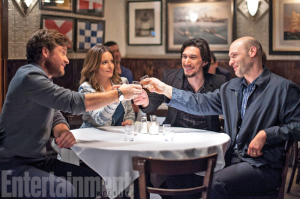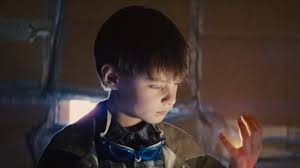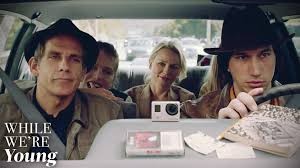CRIME DOES PAY: Movie Reviews of Logan Lucky and The Nile Hilton Incident by Howard Casner
Posted: September 19, 2017 | Author: Donald | Filed under: Uncategorized | Tags: Adam Driver, Channing Tatum, Daniel Craig, Fares Fares, Hillary Swank, Logan Lucky, Rebecca Blunt, Steven Soderbergh, Tarik Saleh, The Nile Hilton Incident | 1,362 Comments » For questions: hcasner@aol.com
For questions: hcasner@aol.com
First, a word from our sponsors: I am now offering a new service: so much emphasis has been given lately to the importance of the opening of your screenplay, I now offer coverage for the first twenty pages at the cost of $20.00. For those who don’t want to have full coverage on their screenplay at this time, but want to know how well their script is working with the opening pages, this is perfect for you. I’ll help you not lose the reader on page one.
Ever wonder what a reader for a contest or agency thinks when he reads your screenplay? Check out my new e-book published on Amazon: Rantings and Ravings of a Screenplay Reader, including my series of essays, What I Learned Reading for Contests This Year, and my film reviews of 2013. Only $2.99. http://ow.ly/xN31r
and check out my Script Consultation Services: http://ow.ly/HPxKE
Warning: SPOILERS
 Everyone in the US seems to agree that the working class is under siege. And it’s still unclear whether there is any real relief in sight.
Everyone in the US seems to agree that the working class is under siege. And it’s still unclear whether there is any real relief in sight.
I’m not sure whether this is the reason filmmakers have been creating stories that focus on the more downtrodden in our society (zeitgeists are almost impossible to recognize until we are out of them), but last year we had Hell or High Water, and more recently we’ve had Patti Cake$, Beach Rats and the topic of this review, Logan Lucky.
All the films have fallen into various genres and niches. Hell or High Water is a modern western/crime film; Patti Cake$ is a musical; Beach Rats is a coming out story; and Logan Lucky is a heist film.
All have, as their central characters, people struggling just to make ends meet or who are lost in a world that seems to have no future for them.
IF ONLY: Movie Review of Silence by Howard Casner
Posted: January 10, 2017 | Author: Donald | Filed under: Uncategorized | Tags: Adam Driver, Andrew Garfield, Issei Ogata, Jay Cocks, Liam Neeson, Martin Scorsese, Rodrigo Prieto, Shusako Endo, Silence | 76 Comments »For questions: hcasner@aol.com
First, a word from our sponsors: I am now offering a new service: so much emphasis has been given lately to the importance of the opening of your screenplay, I now offer coverage for the first twenty pages at the cost of $20.00. For those who don’t want to have full coverage on their screenplay at this time, but want to know how well their script is working with the opening pages, this is perfect for you. I’ll help you not lose the reader on page one.
Ever wonder what a reader for a contest or agency thinks when he reads your screenplay? Check out my new e-book published on Amazon: Rantings and Ravings of a Screenplay Reader, including my series of essays, What I Learned Reading for Contests This Year, and my film reviews of 2013. Only $2.99. http://ow.ly/xN31r
and check out my Script Consultation Services: http://ow.ly/HPxKE
Warning: SPOILERS
 Silence, the new film written by Jay Cocks and Martin Scorsese, who also directed, is adapted from a 1966 Japanese novel by Shusako Endo. The basic premise revolves around two Portuguese priests, Fathers Rodrigues and Garrpe, who go to Japan to find out whether an earlier missionary, Father Ferreira, had buckled under the persecution of the government there, a government that had outlawed Christianity, and renounced his faith.
Silence, the new film written by Jay Cocks and Martin Scorsese, who also directed, is adapted from a 1966 Japanese novel by Shusako Endo. The basic premise revolves around two Portuguese priests, Fathers Rodrigues and Garrpe, who go to Japan to find out whether an earlier missionary, Father Ferreira, had buckled under the persecution of the government there, a government that had outlawed Christianity, and renounced his faith.
When the two fathers reach Japan, they see a cruel world in which the slightest hint of Christianity leads to savage torture. They do what they can for the underground faith while searching for Ferreira, but are eventually caught and tortured themselves.
I have to be honest. I don’t really know how I’m supposed to react to what I see on the screen. Scorsese is definitely sincere in trying to explore the meaning of faith. But for me, I think this is quite possibly the worst film made in some time by a great filmmaker. Read the rest of this entry »
THE WORKING CLASS GOES TO HEAVEN: Movie Reviews of I, Daniel Blake, Paterson and Neruda by Howard Casner
Posted: December 3, 2016 | Author: Donald | Filed under: Uncategorized | Tags: Adam Driver, Daniel Blake, Dave Johns, Gael Garcia Bernal, Golshifteh Farahani, Guillermo Calderon, Haley Squires, I, Jim Jarmusch, Ken Loach, Luis Gnecco, Neruda, Pablo Larrain, Patterson, paul Laverty | 8,269 Comments »For questions: hcasner@aol.com
First, a word from our sponsors: I wanted to say thank you to everyone who contributed to our Indiegogo campaign for 15 Conversations in 10 Minutes. We did very well due to you folks. For those who weren’t able to give, keep us in your thoughts. And if you are able to contribute in the future, contact me and I’ll tell you how. I will even honor the perks on the original campaign.
I am now offering a new consultation service: so much emphasis has been given lately to the importance of the opening of your screenplay, I now offer coverage for the first twenty pages at the cost of $20.00. For those who don’t want to have full coverage on their screenplay at this time, but want to know how well their script is working with the opening pages, this is perfect for you. I’ll help you not lose the reader on page one.
Ever wonder what a reader for a contest or agency thinks when he reads your screenplay? FosCheck out my new e-book published on Amazon: Rantings and Ravings of a Screenplay Reader, including my series of essays, What I Learned Reading for Contests This Year, and my film reviews of 2013. Only $2.99. http://ow.ly/xN31r
and check out my Script Consultation Services: http://ow.ly/HPxKE
Warning: SPOILERS
 Critics, at least those in the U.S., have at times complained about the dearth of movies that focus on the life of ordinary, often blue collar, workers. It’s not that it never happens. We’ve had our On the Waterfronts and Blue Collars.
Critics, at least those in the U.S., have at times complained about the dearth of movies that focus on the life of ordinary, often blue collar, workers. It’s not that it never happens. We’ve had our On the Waterfronts and Blue Collars.
But still, it feels that the lunchbox is more than a bit bare.
Great Britain has fared better, especially since the emergence of the angry young man stories and kitchen sink dramas in the 1950’s and ‘60’s.
British director Ken Loach has even made it his focus to create films about those on the lower rungs of society, especially their struggles to get by. He might even be called the cinematic poet of the working class. Read the rest of this entry »
PASSING THE LIGHTSABER: Movie Review of Star Wars: The Force Awakens by Howard Casner
Posted: December 25, 2015 | Author: Donald | Filed under: Uncategorized | Tags: Adam Driver, Carrie Fisher, Daisy Ridley, Daniel Craig, Domhnall Gleeson, George Lucas, Harrison Ford, J.J. Abrams, John Boyega, Lawrence Kasdan, Lupita Nyong’o, Mark Hamill, Max von Sydow, Michael Arndt, Oscar Isaac, Star Wars: the Force Awakens | 7,746 Comments »First, a word from our sponsors: I am now offering a new service: so much emphasis has been given lately to the importance of the opening of your screenplay, I now offer coverage for the first twenty pages at the cost of $20.00. For those who don’t want to have full coverage on their screenplay at this time, but want to know how well their script is working with the opening pages, this is perfect for you. I’ll help you not lose the reader on page one.
Ever wonder what a reader for a contest or agency thinks when he reads your screenplay? Check out my new e-book published on Amazon: Rantings and Ravings of a Screenplay Reader, including my series of essays, What I Learned Reading for Contests This Year, and my film reviews of 2013. Only $2.99. http://ow.ly/xN31r
and check out my Script Consultation Services: http://ow.ly/HPxKE
Warning: SPOILERS
 The new Star Wars film (Star Wars: the Force Awakens to be exact) has a simple theme: the only thing that can stop a bad guy with the force is a good guy with the force.
The new Star Wars film (Star Wars: the Force Awakens to be exact) has a simple theme: the only thing that can stop a bad guy with the force is a good guy with the force.
All in all, I would have to say that this new entry in the franchise is both better than the original Star Wars and not as good as the original Star Wars.
It’s better acted than what is now known as A New Hope; the dialog is a bit more pithy and witty; the characters are somewhat less one-dimensional; and the special effects less cheesy.
But there’s one thing the original space opera had that the new one doesn’t, can’t and will never have. Read the rest of this entry »
GROWING UP IS HARD TO DO: Movie reviews of While We’re Young and Cupcakes by Howard Casner
Posted: April 16, 2015 | Author: Donald | Filed under: Uncategorized | Tags: Adam Driver, Amanda Seyfried, Ben Stiller, Charles Grodin, Cupcakes, Eli Bijaoui, Eytan Fox, Naomi Watts, Noah Baumbach, Peter Yarrow, While We’re Young | 7,334 Comments »First, a word from our sponsors. Ever wonder what a reader for a contest or agency thinks when he reads your screenplay? Check out my new e-book published on Amazon: Rantings and Ravings of a Screenplay Reader, including my series of essays, What I Learned Reading for Contests This Year, and my film reviews of 2013. Only $2.99. http://ow.ly/xN31r
and check out my Script Consultation Services: http://ow.ly/HPxKE
Warning: SPOILERS
There is much to like in writer/director Noah Baumbach’s musing on growing older, though not necessarily wiser, in his new film While We’re Young.
It’s almost never less than entertaining. And it’s a technically solid piece of work. Baumbach, as a director, feels fully in control of the how the movie looks. As a writer, the characters are often very well drawn and the dialog has a nice rhythmic feel to it, a sort of stylized realism of people from an intellectual background.
At the same time, I’m not sure the movie really comes together as a whole in a fully satisfactory manner. For me, the story itself seemed to flounder at times as it was trying to figure out just what is was supposed to be about.
Overall, my feelings were often those of puzzlement. Is While We’re Young a modern day version of All About Eve that constantly gets off subject, or is it a generation gap morality tale that Baumbach had difficulty finding a strong structure for and sorta, kinda tried to fit it into that of the great film by Joseph L. Mankiewicz? Read the rest of this entry »
DADDY’S DEAD, YOU KNOW…AND WON’T LET US FORGET IT: Movie reviews of This Is Where I Leave You, My Old Lady and The Skeleton Twins by Howard Casner
Posted: September 30, 2014 | Author: Donald | Filed under: Uncategorized | Tags: Adam Driver, Bill Hader, Connie Britton, Corey Stoll, Craig Johnson, Dax Shepard, Debra Monk, Dennis Tripper, Dominique Pinon, Israel Horovitz, Jason Bateman, Joanna Gleason, Katherine Hahn, Kevin Kline, Kristen Wiig, Kristin Scott Thomas, Luke Wilson, Maggie Smith, Mark Heyman, My Old Lady, Rose Byrne, The Skeleton Twins, This Is Where I Leave You, Timothy Olyphant, Tina Fey | 6,180 Comments »First, a word from our sponsors. Ever wonder what a reader for a contest or agency thinks when he reads your screenplay? Check out my new e-book published on Amazon: Rantings and Ravings of a Screenplay Reader, including my series of essays, What I Learned Reading for Contests This Year, and my film reviews of 2013. Only $2.99. http://ow.ly/xN31r
Warning: SPOILERS
 Gosh darn, daddy’s seem to be dropping like flies this month. Three movies have opened lately in which the pater familias is no longer in the picture. Not only that, it’s these fathers that often seem to be getting the brunt of the blame for the way their kids have turned out.
Gosh darn, daddy’s seem to be dropping like flies this month. Three movies have opened lately in which the pater familias is no longer in the picture. Not only that, it’s these fathers that often seem to be getting the brunt of the blame for the way their kids have turned out.
I guess it’s kind of convenient for all the characters involved, then, that the man from whose loins they were loosed is no longer around to defend himself.
But, you know, whatever, I guess. At any rate, he’s dead, dead, dead. And just won’t let us forget it.
Movie Review of INSIDE LLEWYN DAVIS by Howard Casner
Posted: December 26, 2013 | Author: Donald | Filed under: Uncategorized | Tags: Adam Driver, Carey Mulligan, Ethan Cohen, F. Murray Abraham, Garrett Hudland, Inside Llewyn Davis, Joel Cohen, John Goodman, Justin Timberlake, Oscar Isaac | 14,715 Comments »I suppose I should start this review with a disclaimer of sorts. I love folk music. I mean, I luuuuuuuuuuuuve it. I still have CD’s of The Kingston Trio and I had a two album set of Phil Ochs until I disposed of my stereo. On Pandera I have a Judy Collins radio station on call. I grew up listening to those melancholy songs of deep despair and whenever I listen to them now, I just feel a huge pang and ache of beautiful nostalgia. I can still hear the pain in all of it. Even John Denver, whose songs at the time were sometimes made fun of for being too cheery and optimistic, today sound as dark and depressing as the rest of them.
So I guess that makes me sort of a dork when it comes down to it. It’s my moment of geek, I guess you’d say. But it’s possibly my favorite genre of music even after all these year. So I might be a tad prejudiced in favor of the new film Inside Llewyn Davis, from the writing/directing team of Joel and Ethan Cohen and one of the finer films of the year.
Llewyn Davis, the title and central character, is a singer of that particular brand of music. But, in many ways, he’s also a victim of very bad timing. First, he’s a folk singer in New York in 1961, but he’s a solo act. The folk singing field is burgeoning, but only for groups like The Kingston Trio and Peter, Paul, Mary, performers with polished acts that are outwardly, rather than inwardly, focused.
Davis had a partner at one time and they recorded an album. But the partner killed himself and now Davis is singing stag, delivering haunting and heartfelt songs of despair that are more inwardly focused. He’s very good. There should be no reason he shouldn’t be able to succeed. But his kind of folk singing won’t break through for a year or two with the arrival of Bob Dylan, the success of Joan Baez and Judy Collins, and the rise of the singer songwriter. So while the album with his partner did well, his solo effort has failed miserably.
And when he makes his way to Chicago to see an influential manager (played by F. Murray Abraham who gives a remarkable performance in a very small roll; his acting mainly consists of just sitting there with what seems to be blank looks on his face, while at the same time expressing more depth and emotion than more theatrical performers in larger rolls), Davis is turned down because he is not commercial enough.
He’s also just a few years too soon for the movements that made folk so popular: the rise of the hippies; the Viet Nam war; and the Civil Rights moment. The songs and performances of Davis’s time were strongly apolitical after Pete Seeger was accused of being a Communist which led to the break up of the group The Weavers.
Davis is also a victim of bad circumstances. He has a crooked manager. He is accused by the wife of his best friend of being the father of her baby, even though he wore condoms and as far as she knows her husband could be the father, but still he feels forced to do anything to get money for an abortion (including making a bad business decision). He is haunted by the death of his partner, traumatized to the point where he can’t bring himself to take on another one. He is doing so badly, in fact, he has no winter coat and has to beg people for couches to sleep on at night. And he has this cat that…, well, you’ll have to see the movie for that.
This is not to say that Davis, the human being, is perfect. He’s incredibly self-absorbed and has difficulty feeling anyone else’s pain (which is both ironic and appropriate for the sort of internal kind of folk he sings). He looks down on everyone (I always felt the Cohen’s were a bit too misanthropic and ridiculed people in an often unkind way, but either I’ve gotten so used to their style, or they’ve taken the edge off, or it could be that Davis is so imperious that I just can’t look down on the other characters the way he does). And he always seems puzzled as to why he is not the center of the universe. Yet for me, I still felt he was more sinned against than sinning.
I’m not sure what has happened to casting directors this year. I’m not saying they’ve been falling down on the job before now. But films this year have shown some of the most imaginative and witty casting in some time. I first noticed this with Woody Allen’s Blue Jasmine (of course, his movies have always been brilliantly cast, no matter how good or bad they were), but it has continued on through such films as Nebraska, American Hustle, Saving Mr. Banks and now Inside Llewyn Davis.
The title role is inhabited by Oscar Isaac in what is termed a breakout performance. Relatively new to movies (his myriad of parts have been relatively small until now), he gives a very empathetic performance of a man who keeps struggling even when he’s no longer sure what he’s struggling for. John Goodman finally has a role that’s not a John Goodman part and he makes the most of a haughtier than Davis, drug addicted poet that imparts a very acute observation about the death of Davis’s partner (with a driver played by Garrett Hudland who is basically playing the same roll he played in On the Road, and as weakly).
Justin Timberlake seems to be having fun satirizing himself a bit as Davis’ overly upbeat best friend whose voice is a bit reedier than the hero’s. Carey Mulligan, as the wife, gives more depth to a somewhat misogynistic roll of a woman who thinks she’s been scorned, when she hasn’t (she breaks through the anger of the character and makes her part more real and sympathetic that it comes across at first). And Adam Driver has a very droll roll as the third part of a trio singing a novelty song, providing some very funny background recitative (though perhaps a song that is a bit too harmonic to be as novelty as it is suppose to be).
And it’s all played out against a strong feel of period and place in the design of costumes, sets, dialog and overcast cinematography of never ending snow.
In the end, Inside Llewyn Davis may be little more than a character study and like other movies of the same vein made by the Cohen brothers (like A Serious Man), I’m not sure what it all adds up to. But also like A Serious Man, I’m not sure I care. I was just too riveted by Davis and his story to try to make it add up to anything. And whenever the characters broke into song, I was flung back into those early days of rapture. The film is as haunting and moving as the lieder that punctuate the action. What the Cohen brothers may not have achieved intellectually, they have more than made up for instinctually and emotionally.
Movie Review of FRANCIS HA by Howard Casner
Posted: May 24, 2013 | Author: Donald | Filed under: Uncategorized | Tags: Adam Driver, Charlotte d’Amboise, Frances Ha, Greta Gerwig, Michael Zegen, Noah Baumbach | 153 Comments »When I first started watching Frances Ha, the new comedy of quirkiness directed by Noah Baumbach and written by Baumbach and its effervescent star, Greta Gerwig, I have to admit that my heart sunk a bit. It had all the earmarks of one of those mumble core movies, that “hey, my uncle’s got a barn and my aunt can make the costumes, so let’s put on a show” movement that had nothing to say and nothing to offer and that seriously (I mean, seriously) bored the hell out of me. At first Frances Ha seems like mumblecore prime, filled as the opening scenes are with annoying and self-absorbed people who think they are fascinating, but aren’t remotely, backed by cinematography in pretentious black and white.
But it’s not long before something very odd, and maybe even ironical, happens. The more annoying and unlikable Frances becomes, the more likeable and less annoying she becomes, which, as a friend of mine said, is a pretty neat trick. And it’s not long before you’re won over and find yourself completely entranced by the Frances and her story.
Frances is someone who so thought she was going somewhere: she has the perfect best friend/roommate, someone who really gets her; she has a boyfriend; she is a dancer and teacher for a dance company that she thinks is going to be her future. And then, as happens so often in life (which is a good thing for screenwriters or otherwise we wouldn’t have anything to write about), she loses everything in a quick succession of events. And suddenly she’s left floundering.
And boy does she flounder, like a fish flopping around on a boat, she flounders. The structure of the film is basically made up of a series of scenes that are defined by the many different locations she is forced to move to and from as she tries to figure her life out. She has no stability and no future. But she is Frances Ha, which means that no matter what else, she never gives up. No matter how foolish and stupid she looks, she never stops trying. And she never loses her most endearing trait: her sincerity. In fact, it grows. As she becomes more and more annoying and unlikeable, and becomes less and less stable (like panicking and flying to Paris on the spur of a moment’s notice—a wonderful set of scenes, and if I had a nickel for every time I’ve done that), she just becomes more and more sincere. Meanwhile all the people she knows, as they become more and more stable, they become less and less sincere, become as pretentious as the black and white photography used to film them. And soon Frances becomes the most likeable and sympathetic character in the movie because she’s about the only one with a heart.
There is a nice supporting cast here, with an always more than welcome Adam Driver (Lena Dunham’s sort of, kind of on again, off again boyfriend in Girls) and Michael Zegen as Frances’s callow second set of roommates as well as Charlotte d’Amboise as a choreographer who cuts to the chase like a knife (she’s the only other really likeable character in the story, probably because she is just as sincere as Francis—hell, she doesn’t have time to be anything but). And on a bit of trivia note, Frances’ parents are played by Ms. Gerwig’s own.
But in the end, of course, it’s Gerwig who holds the movie together. True, she exudes so much charm it might be wise to wear a radiation suit while watching the movie, but she is pretty marvelous, more than willing to let herself look foolish and unflattering. At the same time, I’m not fully convinced that Frances has earned her happy ending (which is perhaps more bitter sweet than happy, but still, the point still stands). There seems to be a step missing, the one moment where Francis realizes she has been backed into a corner and has to make a decision she doesn’t want to make; this seems to happen off screen. At the same time, Gerwig has earned so much good will from the audience, it’s almost impossible to not want her to land on her feet. Dramatically the movie may not have earned it, but Gerwig herself has and that’s good enough for me.
Tell me what you think.
Movie Review of GAYBY by Howard Casner
Posted: November 1, 2012 | Author: Donald | Filed under: Uncategorized | Tags: Adam Driver, Alex Karposvky, Gayby, Jenn Harris, Jonathan Lisecki, Matthew Wilkas, mumblecore | 5,018 Comments »There is a line repeated a couple of times in the new indie Gayby in which the hero, Matt, asks a potential sexual partner if they can not go below the waist. I have to be honest. I’m not even sure exactly what that means when it comes to doing the deed (except it seems to suggest they won’t be doing it). But at the same time, I think in many ways, it’s a rather apt description of the movie. Gayby is a perfectly okay movie. It’s solidly done and one has to give street creds to writer/director Jonathan Lisecki (who also plays Nellie Bear Nelson in it) for getting it done-no mean feat these days. It also gets some laughs and has some moving moments. At the same time, it never really rises above what it is. It never takes any real chances. It doesn’t have much of an edge. It’s very non-threatening. It’s also one of those movies with gay characters and gay subject matter in which all the sex in it is straight. In other words, it never really goes below the waist.
The basic premise of Gayby is that a straight woman, Jenn (played appropriately enough by Jenn Harris), wants a baby, but is tired of the Sisyphean task of trying to find a husband in New York City (don’t you find it odd in movies like this that the central character who continually wails that it’s impossible for anybody to find a mate in any city is usually the only single person in the whole film?). So she asks her best gay friend Matt (played by Matthew Wilkas—don’t worry, that’s where the naming pattern ends) to impregnate her. And he agrees. At the same time, Matt is still recovering from the break up of a six year relationship that apparently was so bad that he asked his ex- to not come by the comic book store Matt owns on the days that Matt is there, even though the ex- is in the comic book business (at the end Matt makes a request of this ex- that is suppose to suggest a fulfillment of his character arc, but suggested instead to me the opposite and more indicated someone who makes bad business decisions).
But in the end, for all its positive points, Gayby is more for people who have never seen Will & Grace, or actually any movie in the last twenty years that revolves around gay parenthood. The only original take here is that Jenn wants to get pregnant the old fashioned way—by the missionary position. It’s an interesting idea, but since it really only takes up a minute part of the movie and is never really a driving force of the story, it doesn’t really add much to what has come before. Beyond this, Gayby is a pretty familiar story with pretty familiar conflicts played out in pretty familiar ways (with all the characters living in the most amazing apartments and homes that seem far beyond their pay grade). The only really clever twist comes toward the end and show promise, but since Gayby is basically an extended sit-com episode, even that doesn’t really cause that much of a ruckus. By the time the whole thing is over, everyone has found their happy ending with everything resolved in rash free and comforting bunting (there is one note of ambiguity at the end that is very odd—and it’s unclear why Lipinski does this).
As a writer, Lipinski has a way with a clever bitch of a line and is having a ton of fun with an inside look at how the younger generation of gays see themselves with all their personal patois and inside look at themselves (what’s funny is that the very young Matt is already feeling he is being left behind by this younger set). However, Lipinski is not as deft when it comes to the acting. Though no one can be said to give a bad performance, at the same time, everybody hits their lines a bit too hard, telegraphing their emotions a bit too much. It works against the humor at times with scenes often falling flat.
At the same time, it must be said that when it comes to the acting, there are some welcome additions here in two refugees from the mumblecore movement: Adam Driver (who plays Lena Dunham’s boyfriend on Girls—he has one of the most fascinating faces in movies today—he shouldn’t be sexy looking, but somehow he is) and Alex Karposvky. What Parker Posey and James LeGros were to the independent movies of the ‘80’s and ‘90’s, Karposvky is to mumblecore—always a welcome sight.
And Gayby is a mumblecore film with all its virtues and faults. From a virtue standpoint, it got done. Someone decided he wanted to make a film and found a way to do it. From a fault standpoint the film is also, if truth be told, a bit bland with no ambition to be anything more than a safe, not below the waist evening in the movie theater. From one point of view, I suppose it’s great that we now know that mumblecore swings both ways. I think that says a lot for mumblecore. I’m not sure it really says quite as much when it comes to movies with gay characters.










 Midnight Special, the new neo-noir/sci-fi film, opens at night with a throbbing music score backed by hypnotic drums. It grabs you by your neck and just won’t let go for the next ninety minutes. At first, the story seems to be about the abduction of a little boy, but it soon becomes clear that it’s much more complicated than that. The boy was adopted by the leader of a religious cult that makes its base in a private compound in Texas and the ones who have taken the boy from them is the boy’s biological father and the father’s closest friend.
Midnight Special, the new neo-noir/sci-fi film, opens at night with a throbbing music score backed by hypnotic drums. It grabs you by your neck and just won’t let go for the next ninety minutes. At first, the story seems to be about the abduction of a little boy, but it soon becomes clear that it’s much more complicated than that. The boy was adopted by the leader of a religious cult that makes its base in a private compound in Texas and the ones who have taken the boy from them is the boy’s biological father and the father’s closest friend.

